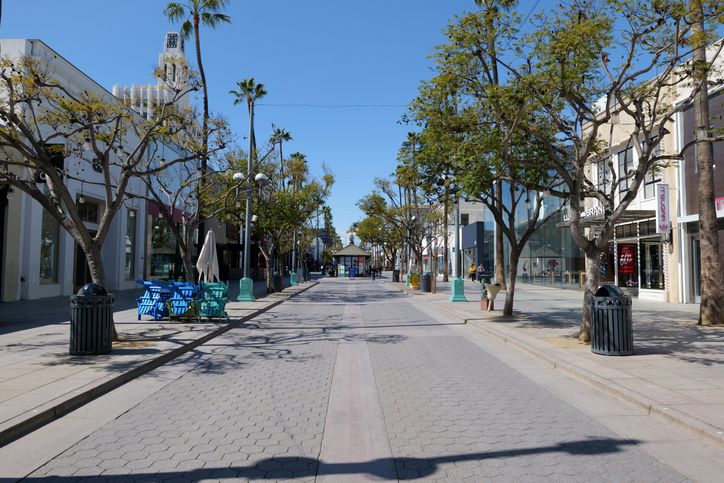“Promoting our economic recovery is of the highest importance,” said Councilmember Caroline Torosis as she and her colleagues heard the first reading of an interim zoning ordinance (IZO) intended to revitalize the Third Street Promenade and Downtown Santa Monica.
The proposed IZO would do a number of things in an effort to bring life back to the struggling downtown. They include:
- Allowing greater flexibility for restaurants to provide entertainment
- This would include allowing for music and dancing, a disc jockey, stand-up comedy, or poetry readings
- Removing restrictions on the size and number of television screens allowed, presumably for sports viewing
- Eliminating rules against pool tables, dart boards, or video games
- Allowing for “Pub crawls”
- Expanding Alcohol Exemption (AE) permits to additional uses to further streamline the review of alcohol permits while also correcting and refining existing AE permit conditions
- Would allow AEs for outdoor rooftop commercial uses, art studios, museums, instructional facilities (e.g. painting lessons offering wine), and convenience stores
- Allowing the Director of Community Development or designee to consider commercial uses that are not clearly defined in the Zoning Code
- Allowing a longer term for Temporary Use Permits
- Expand to up to six months
- Allowing outdoor rooftop commercial uses on public parking structures owned by the City
- This could include pop-up cinemas
- Floor Area Ratio (FAR) requirements would be exempted
The IZO would also allow these changes and increased flexibility for locations at Santa Monica Place.
Councilmember Lana Negrete encouraged staff to engage with business owners to hear “what’s holding them up” when it comes to lost business and the tools they need to succeed.
Mayor Gleam Davis was complimentary of expanded terms for temporary use permits, and on the increased flexibility said, “As we really start to think about our zoning code, it should be much less prescriptive in terms of ‘this is a list of things you can do’ because the fact of the matter is – with all due respect to our staff and everyone up here – we have entrepreneurs out in the city that are thinking of things that none of us would be thinking are good ideas.”
The motion to advance the IZO passed unanimously, 7-0.
Another agenda item had the council consider and discuss the budget for Downtown Santa Monica Inc. (DTSM), with much focus centered on security. But Torosis asked at one point if any of the commercial landlords had considered subdividing any of the larger business parcels in an attempt to lower the current 28 percent vacancy rate downtown. Jennifer Taylor, an Economic Development Manager with the city stated it falls within the realm of possibilities if a property owner sees a potential benefit to it. She added that they have encouraged owners to consider demonstration projects like temporary “pop-up” shops.
There was debate surrounding the hiring of private security guards through a contract with security firm Covered 6. Some think they are vital to making residents and visitors feel safer downtown, while others have use of force and other legitimate concerns, including whether the guards would be armed or displacing the Santa Monica Police Department.
Negrete wanted to clarify that, “In no way will having this private security take the place of any overtime positions that are specifically staffed by SMPD, including the Friday night shift, and the two shifts on Saturday, correct?” To which City Manager David White assured, “This resource does not in any way affect our deployment of police department resources.” He added, “This resource is not designed to replace, undermine, or in any way determine how we deploy our police department.”
A give-and-take between Councilmember Jesse Zwick and DTSM CEO Andrew Thomas brought out that the security arrangement will mean a net loss of 16 Downtown Ambassadors that greet and guide the public and have for more than a decade. They will be forced to find employment at another commercial facility served by their employer, Block By Block. It also revealed that three Covered 6 guards will be on duty at most hours of the day and night, with the supervisor on duty being armed, who Thomas assured would always be a former law enforcement officer.
“I guess I’m just trying to understand in what instance we would ever want a private security officer firing their weapon on the Third Street Promenade?” asked Thomas.
Thomas responded, “I hope never,” and added that he feels their judgment and ability to calm any disturbing situation is their strongest value.
Torosis asked about the level of training a supervising officer would have met or received prior to being given that responsibility. Michael Grant with Covered 6 was on hand to respond that it would be a former police officer that has served honorably in a California jurisdiction. They would also be licensed through the Bureau of Investigative Services with the State. Grant also said they receive additional training for this line of work from Covered 6.
Prompted by a series of questions from Negrete, Grant described the types of security officers hired as being friendly and approachable, if not outright gregarious, and that they are people focused on not only public hazards but also serving much like the DTSM ambassadors in that they would guide people around and pick up trash. Grant assured the council that we wouldn’t see “stoic types” in these roles. He did say they will take an active role in engaging with the unhoused with an eye toward encouraging them and directing them to social services. Such engagements would be tracked and reported to appropriate agencies.
Councilmember Oscar De La Torre asked about the use of force, saying he seemed to hear from other comments that the focus would be on de-escalation. This was confirmed by Grant, who said that Covered 6’s own use of force policy states, “They shall have a high-reluctance to use force.”
Later, responding to another question from Zwick, an armed supervisor would only respond with a firearm “if there’s an immediate, imminent defense of life” incident occurring. But Grant said even then, they are involving the SMPD.
As the council neared passage of the DTSM budget and proposed operational changes, Zwick tried offering an amendment that no officers be armed. It was not met as friendly. He then tried to move that the armed officer not have a gun chambered until engaged in an incident, and was again rebuffed. He later offered his first amendment as a substitute motion, which seemed to set off an already bristling Negrete, whose patience had clearly expired.
Mayor Davis reserved some comments for the end of the discussion, expressing concern, as she has in the past, over the use of private security. However, she recognized that half of the DTSM Board are appointed by the property owners and that private security is something they really want. So she agreed to defer to them for the one-year trial period in the proposed plan before the council.
Zwick ultimately joined his colleagues in passing the budget and plan unanimously 7-0.
Photo by MSPhotographic
Stay informed. Sign up for The Westside Voice Newsletter
By clicking submit, you agree to share your email address with Westside Voice. We do not sell or share your information with anyone.








